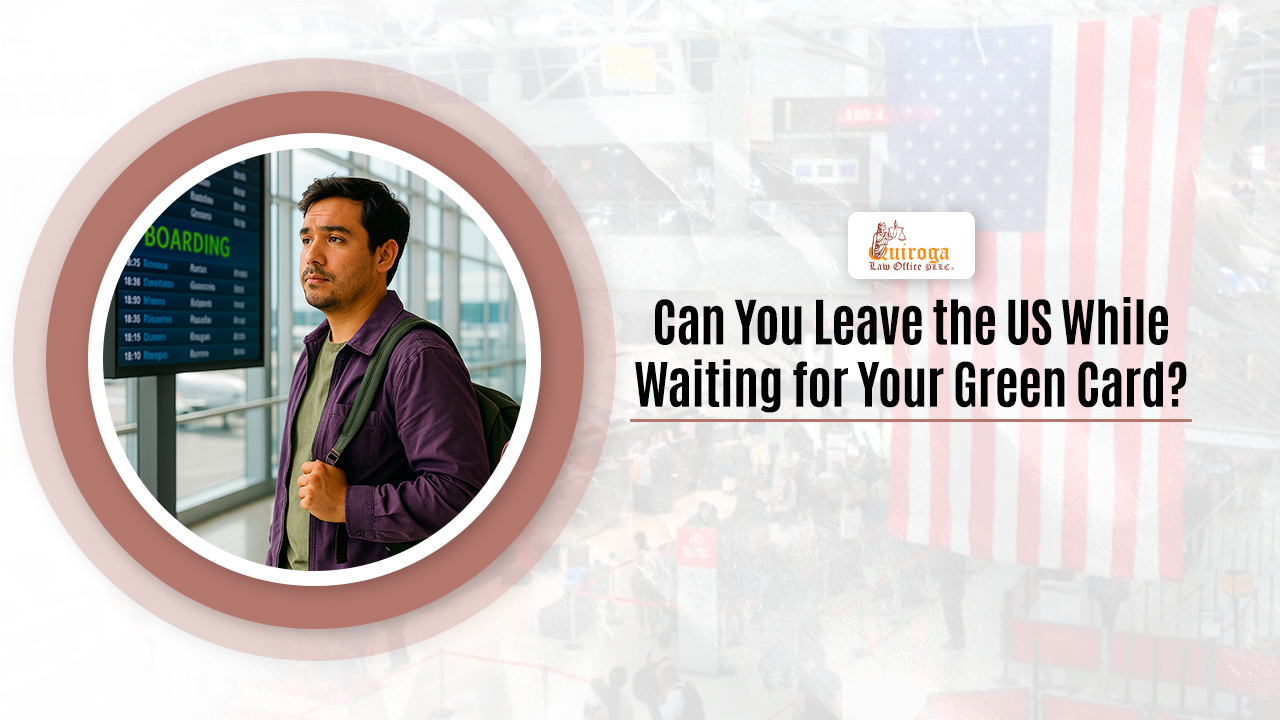If you are in the process of obtaining your permanent residence, you may have questions about whether you can travel outside the US without affecting your application.
Although leaving the country may seem simple, the reality is that this is a complex legal matter with serious immigration implications.
This guide provides clear answers to help you make informed decisions, avoid mistakes, and protect your case.
What Happens If You Need to Leave the US While Waiting for Your Green Card?
Whether you can leave the US depends on:
- The stage of your green card application.
- The reason for your trip.
- Whether you already have permission to travel.
US immigration laws are very clear: If you need to travel while waiting for your green card, you must apply for and obtain a document called Advance Parole before leaving.
This permit is not optional. Without it, your trip could have serious consequences, including the cancellation or abandonment of your residency process.
What Is Advance Parole?
Advance Parole is a reentry permit issued by US Citizenship and Immigration Services (USCIS) for immigrants in certain processes, such as adjustment of status.
This document allows temporary travel outside the US and ensures that your departure is not considered abandonment of your green card application.
Key Features of Advance Parole:
- It is an official document with your photo, typically valid for one year.
- It must be requested before traveling, and you must wait for approval before leaving the country.
- It protects your residency application and prevents problems at the port of entry upon return.
What Happens If You Travel Without Advance Parole?
If you leave the US while waiting for your green card and do not have Advance Parole, USCIS may consider your case abandoned. This can have serious consequences, such as:
- Cancellation of your case: USCIS may terminate your green card application, forcing you to restart the entire process.
- Legal issues: You could face additional obstacles when trying to adjust your status in the future.
- Denial of reentry: Even if you have valid documents, you may be denied entry at the port of entry.
For these reasons, obtaining Advance Parole before traveling is crucial.
Who Needs to Apply for Advance Parole?
This permit is required for certain immigrant groups, including:
- Adjustment of status applicants: If you are waiting for your green card, you need Advance Parole to travel without affecting your case.
- Asylum seekers: Leaving the US without this permit is considered abandonment of your asylum application.
- TPS beneficiaries: The permit allows them to travel and return without losing their continuous physical presence.
- DACA recipients: They can apply for Advance Parole only for humanitarian, educational, or work-related reasons.
Steps to Apply for Advance Parole
If you need to travel, follow these steps to apply for this permit:
1. Complete Form I-131
- This is the official form used to apply for Advance Parole.
- Make sure to fill it out correctly and provide all required information.
2. Explain the Reason for Your Trip
- You must detail why you need to travel and attach supporting documents.
- Examples of acceptable reasons include:
- Medical letters.
- Job-related invitations.
- Family-related documents.
3. Submit Your Application to USCIS
- After completing Form I-131 and gathering the necessary documents, submit your request to USCIS.
4. Wait for Approval
- Do not leave the US until your Advance Parole is approved and you have the document in hand.
What Happens at the Port of Entry Upon Returning?
Even if you have Advance Parole, reentering the US is not guaranteed.
At the port of entry, immigration officers will review your documents and background before allowing you to enter.
To avoid problems, make sure you:
- Carry all necessary documents.
- Ensure your trip aligns with the conditions of your permit.
If immigration officers find anything suspicious, they may deny you entry, even if you have Advance Parole.
How Long Does It Take to Get a Green Card?
The processing time for a green card depends on various factors, including:
- The category of your application.
- USCIS workload.
Estimated Processing Times:
- 6 months to 2 years for family-based adjustment of status cases.
- 2 to 5 years for complex cases or those with lower priority.
To avoid delays, make sure to:
- Submit all required documents.
- Respond quickly to any additional requests from USCIS.
Practical Tips to Avoid Problems
Now that you understand how Advance Parole works and the risks of traveling without permission, here are some key tips:
- Plan ahead: Apply for Advance Parole well in advance before your trip.
- Consult an immigration attorney: If you have questions, seek legal advice to avoid mistakes.
- Avoid unnecessary travel: If your trip is not urgent, consider waiting until you complete your green card process.
What Should You Remember?
- Leaving without permission may cancel your green card application.
- Advance Parole is required to protect your case and avoid legal issues.
- The time it takes to receive your green card depends on USCIS processing times.
With this information, you can make informed decisions and protect your path to permanent residency. Don’t risk your future!



